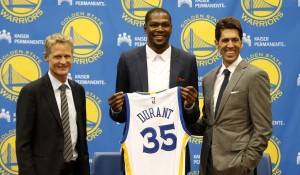NBA teams’ dreams are no competition against NBA players’ wishes
Commissioner Adam Silver and NBA team owners say they want to avoid the creation of “super teams.” They want franchises like Oklahoma City to keep their homegrown stars like Kevin Durant. They want great players distributed instead of clustered like in Golden State.
I want a new basement, a four-year full ride for my youngest child and a large lump-sum payment via direct deposit.
In my case, as with the league, the emphasis is on what we “want,” which has nothing to do with what we actually “need.”
I can survive with the basement as is, cobble together funds for Sequoia’s college education and make do with my current income. Likewise, the NBA will continue to thrive with star-studded teams, outposts that are less desirable than others and clear-cut heavy favorites such as the Warriors.
“Just be absolutely clear, I do not think that’s ideal from the league standpoint,” Silver told reporters last week about Durant joining Golden State.
Here’s what’s not ideal from many players’ standpoint: Spending their entire career in places like Oklahoma City, Sacramento or Milwaukee.
Sequoia is a huge Thunder fan. She fretted over Durant’s impending decision and was depressed when he bolted. I’m helping her prepare for Russell Westbrook’s near-certain departure and she doesn’t understand why her favorite players are leaving her favorite team.
There could be any number of reasons. Maybe Durant secretly hated playing with Westbrook, an immensely talented and infuriating talent. Maybe Westbrook has always dreamed of joining his hometown Lakers and is determined to do so when given the opportunity. Maybe neither of them likes the lifestyle in OKC, which seems more attuned to college life than professional sports.
The reason really doesn’t matter.
When players reach a certain point in their careers, the next step is their decision for the first time. Teams have all the power before then – sometimes drafting and trading a player on the same night – but they have not one iota in free agency. The only hope for teams with any chance, is to make an impressive presentation while trying to woo the coveted prizes.
Few squads could make themselves more attractive than Golden State, coming off two consecutive NBA Finals appearances, playing a beautiful brand of basketball, possessing All-NBA caliber stars and residing in a cosmopolitan metro area.
What’s not to like?
Wanda Durant helped Silver understand why her son joined forces with Steph Curry et al and why it isn’t a good comparison to the formation of past super teams. “I was talking to Kevin Durant’s mom and every situation is different,” Silver told cleveland.com last week. “This was a team in Golden State where they have three all-stars who were all drafted. A team that’s under the cap. And one free agent, who also happens to be a superstar, makes a decision to go to that team.
“It’s very different than if multiple players from different teams had come together and said ‘Let’s all land on yet a completely different team.’”
He has a problem with that scenario, but it’s perfectly OK if a team drafts a star point guard (Kyrie Irving), signs a superstar free agent (LeBron James) and trades for an All-Star power forward (Kevin Love). And there’s no problem if a team trades for an opponent’s pair of aging, future Hall of Famers (Paul Pierce and Kevin Garnett).
No, general managers are free to wheel and deal as they see fit in attempts to build the best possible. They’re encouraged to use draft picks, trades and free-agent signings in an effort to crush the competition and win a championship.
But when players take matters into their own hands? Oh no!
Miami Heat president Pat Riley gladly scooped up LeBron James from Cleveland and Chris Bosh from Toronto prior to the 2010-2011 season. He didn’t care about the organizations those fans left behind. He didn’t care about the fans whose hearts were broken. He didn’t care about possible league imbalance as the Heat’s Big Three drew a full-time reporter from ESPN.
Now, after losing James and Heat lifer Dwyane Wade, with only damaged-goods Bosh left behind, Riley is sounding the alarm on and advocating an NFL-like move for the league.
“I believe that there should be a franchise tag on one of your guys,” Riley told reporters last week. “My opinion of a franchise tag – this is why they don’t allow me to talk and give opinions in the collective bargaining agreement – is that a franchise player to me would be a player in which you can pay him as much money as you want.
“… if you franchise somebody then you have the ability to protect [against your star player leaving for a super team].”
Durant has a $300 million Nike deal; James’ deal is worth a half-billion dollars. If those guys are determined to take their talents elsewhere when given the chance, they’ll accept less if necessary from their future team.
No matter how hard, say, Utah, tries to keep its next superstar, he might be planning to bolt as soon as he reaches town. The Jazz will “want” to keep him, but he’ll “need” to escape.
There’s no way around that. Nor should there be.
 Follow
Follow

